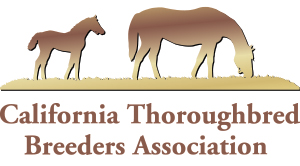By Bloodhorse.com
FAIR HILL, Md. (May 13, 2019) — Kelly Rubley unsaddled her stakes-winning 6-year-old General Downs after a disappointing finish in an allowance race at Churchill Downs and headed to the airport. Never mind that it was Kentucky Derby Day, and she had watched the race every year on TV since she was a child. She wanted to get home to her barn in Fair Hill, Md.
The flight was mostly empty because who’s flying out of Louisville the day of the Derby? Fortunately, for Rubley, it had a television and she could watch the race.
“I’m trying not to scream; I’ve got my earplugs in,” Rubley said. “I’ve always screamed at the races. It was a very empty airplane, which was helpful. So, I had the whole row to myself, so nobody thought I was nuts.”
Rubley told the Derby story standing outside the stall of a 3-year-old that will thrust her straight into the heart of the Triple Crown May 18. Alwaysmining, a gelding by California stallion Stay Thirsty that she trains for Runnymede Racing, has reeled off six straight wins at Laurel Park by a combined 36 lengths and now will be tested for class in the Preakness Stakes (G1) at Pimlico Race Course.
For Rubley, who grew up in tiny Pulaski, N.Y., 38 miles north of Syracuse and five miles east of Lake Ontario—not exactly horse country—the race will be the pinnacle of a lifelong obsession with horses.
“Since I could talk, all I ever wanted to do was touch horses,” she said. “No one in my family is with horses, but I’ll tell you the first time I set eyes on a horse, I was in love.
“My parents gave me a riding lesson to get it out of my system, and that didn’t work,” she laughed. “They then proceeded to support my showing career throughout my high school and early college until I was able to do it on my own. The nearest track to where I grew up was Finger Lakes, and I never stepped foot on it. So, I showed hunter-jumper quarter horses. I think they regretted giving me that riding lesson.”
Rubley’s parents made sure she got an education, and she did apply herself, earning a bachelor’s degree in biology and chemistry and Master of Science degree in secondary education from SUNY-Oswego. She wound up teaching middle school and then moving into administration, but horses always called to her.
Always the outsider, and with no interest in starting a family, Rubley took the leap and moved down to Unionville, Pa., to work on a farm and ride with the famed Cheshire Foxhounds. She showed up unannounced one day at the Fair Hill Training Center looking for a job as an exercise rider in 2009 and got hired by Barclay Tagg, who in his youth had ridden with the same hounds.
Rubley didn’t know she was going to be a trainer at first, but when she decided that was her goal, things developed rapidly. Within two years, she was Tagg’s assistant. Over the next three years, she handled Tagg’s horses at Fair Hill as well as his Palm Meadows string while he was at Gulfstream Park, and the Belmont Park string while he was at Saratoga Race Course. She also trained horses for him at Delaware Park and Monmouth Park across five years.
“When I left, Barclay, he was not pleased with me, but only because of the fact that I had become a vital part of his operation,” she said.
At times, Rubley’s career appears to be partly guided by kismet, or fate. She fell in love with Fair Hill and knew she wanted to launch her own training career there. In fact, she knew that soon after she started with Tagg. The opportunity arose at Fair Hill to oversee a string of horses for trainer Jimmy Toner, who had an owner, Justin Nicholson, who bought a barn there. Toner was far less hands-on than Tagg, so she developed her independence with him and struck out on her own in 2014.
Owners have tumbled into her sphere far easier than they do with many new trainers, particularly women. She trains turf star Divisidero for Gunpowder Farms and Brereton Jones, has horses for West Point Thoroughbreds and, now, Alwaysmining for Runnymede Racing.
“I don’t know why that happened,” Rubley said about how she locked into such quality owners. “I recognize and appreciate that. It’s not for lack of hard work. I’m in the barn seven days a week, but Barclay taught me that.”
Alwaysmining’s arrival also was one of lucky timing. After the gelding broke his maiden in his fourth career start at Laurel Park, Runnymede bought him privately from owner James McIngvale.
“He was meant to just be kind of a useful, fun horse for them,” Rubley said of Runnymede. The horse was sent to trainer Edward Graham and raced one time before he and Runnymede parted ways.
“It was truly lucky,” Rubley said, “because Runnymede bought a barn here at Fair Hill, and I was renting the barn from them, and they said we’ve got this horse we want to send into you. And there he is. Truly lucky!”
Rubley saw a “gangly 2-year-old with lots of leg and an amazing stride. You could see there was a nice horse in there, but he hadn’t quite developed into what we have now.”
She knew Alwaysmining wanted to go long, but 2-year-old route races rarely get written into the condition book. She ran Alwaysmining on the grass in the Laurel Futurity just to keep him busy and then waited. When a mile race finally came up at Laurel in October, she entered, and he won by 10 lengths.
Since then, Alwaysmining has won five straight stakes at the Maryland track, employing a high cruising speed against overmatched opponents, culminating with an 11-length score in the Federico Tesio at 1 1/8 miles, which was an automatic qualifier for the Preakness.
Rubley knows her horse matches up with the top 3-year-olds in all the speed figure ratings. She hasn’t changed his regimen just because he’s going to run in one of the biggest races in the country.
“We’re not changing anything,” she said. “This horse loves to train; that’s the key. The goal with him is to literally not let him do too much because it’s very easy for him. He’s just all business—loves to train, loves to go to the track, and he’s just a really mellow, nice horse to be around.”
Rubley would love to win the Preakness, but she also sees just being there as an advertisement for her capabilities. As of May 11, she had 11 wins from 70 starts this year, and she emphasizes developing horses rather than putting up a gaudy winning percentage, something else she learned from Tagg.
“The goal is to be improving the stable,” she said. “Just having the recognition from this horse, regardless of how he runs next Saturday, we’ve won six races in a row and that certainly has to have put my name on somebody’s radar that it wasn’t on previously.”


